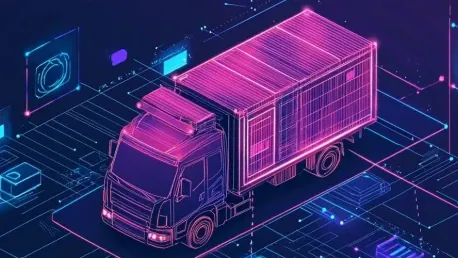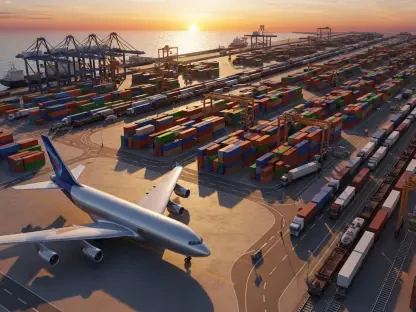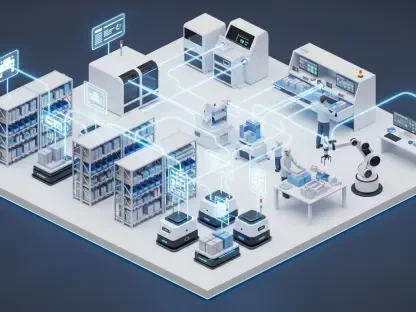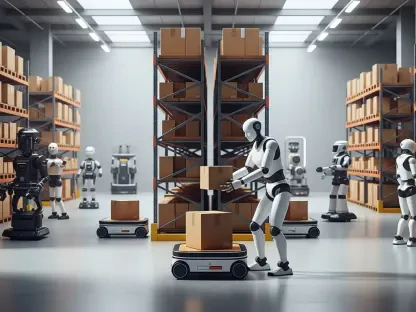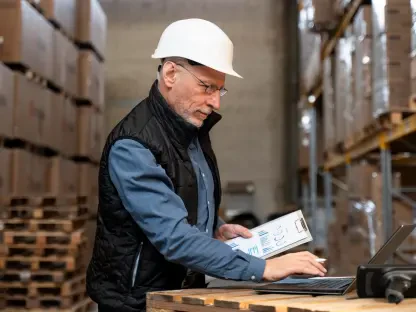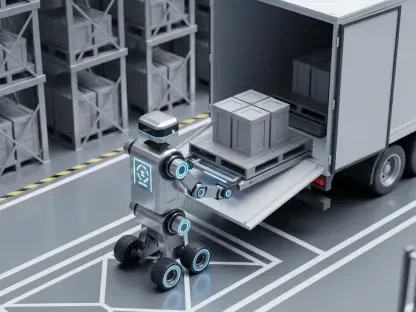In a significant leap forward for the logistics industry, CargoX, led by CEO Bojan Čekrlić, has announced a large-scale partnership with Hyundai Merchant Marine (HMM), one of South Korea’s leading container transportation and shipping companies. This collaboration not only marks a considerable endorsement of blockchain technology for logistics documentation but also signifies a pivotal moment in the digital transformation of the logistics sector.
The Significance of the HMM Deal
Growing Trust and Adoption of Blockchain
The partnership with HMM, one of the largest carriers globally, underscores the increasing trust and adoption of blockchain-based solutions in the logistics industry. Bojan Čekrlić highlighted the importance of this partnership as a major step toward achieving interoperability and global supply chain cooperation in a digital format. The endorsement from HMM significantly boosts CargoX’s market position, cementing its leadership in the industry’s digital transformation.
This collaboration is more than a vote of confidence; it’s a testament to the efficiency, security, and environmental sustainability that blockchain technology promises. By dramatically reducing reliance on paper documentation, the partnership is set to bring massive cost savings and reduce CO2 emissions. Čekrlić pointed out that the shift to digital documentation underscores the environmental benefits of such technological advancements, supporting global sustainability efforts.
Enhancing Efficiency and Sustainability
In addition to bolstering trust, this collaboration aims to enhance operational efficiency and promote environmental sustainability. The logistics industry is notorious for its dependency on paper documentation, which is not only labor-intensive but also environmentally harmful. By embracing blockchain technology, CargoX and HMM are paving the way for a more efficient and eco-friendly method of managing logistics documentation. This could lead to substantial cost savings for the industry at large, as digital documentation inherently reduces administrative overheads and speeds up processing times.
Moreover, this partnership aligns with global efforts to mitigate climate change. The reduction of paper usage directly translates to lower deforestation rates and decreased carbon footprints. Čekrlić highlighted that moving towards digital documentation is a crucial step in the industry’s commitment to sustainability. The collaboration stands as a beacon for other logistics companies to follow, showcasing the dual benefits of financial efficiency and environmental responsibility.
Gateway to South Korea and Beyond
Broader Opportunities in South Korea
The deal with HMM serves as a gateway to broader opportunities not just in South Korea but potentially with the Korean government as well. The partnership is seen as a precursor to working with governmental initiatives like the Advance Cargo Information (ACI) system. Čekrlić emphasized that both carriers and governments are increasingly leaning toward standardizing electronic documents, which could set a new standard for the industry and lead to wider adoption of digital logistics solutions across the region.
By aligning with HMM, CargoX opens the door to beneficial collaborations that extend beyond commercial enterprises to governmental agencies. South Korea, known for its technological prowess, represents a promising market for the adoption of digital logistics solutions. The potential to work with the Korean government on initiatives like the ACI system would further solidify CargoX’s position as a leader in digital logistics. Such collaboration underscores the increasing need for standardized electronic documents, which streamline operations and enhance security, thus benefiting the entire logistics sector.
Pioneering Government Collaborations
Working with HMM paves the way for CargoX to collaborate with governmental bodies on initiatives like the ACI system. This collaboration highlights the increasing push towards electronic document standardization, which can streamline processes, enhance security, and further drive the digital transformation of the logistics sector.
Governmental endorsement paves the way for sector-wide reforms that could set new industry standards. By collaborating on projects such as the ACI system, CargoX and HMM have the opportunity to influence regulatory practices, driving the logistics industry towards a more digital future. Governmental backing provides an extra layer of credibility and security, making it more likely for other companies to follow suit. This domino effect could lead to widespread adoption of digital documentation and blockchain technology across the logistics sector, setting a precedent for global standards.
Blockchain and Tokenization: Game Changers for Shipping
Ensuring Document Authenticity and Integrity
At the core of CargoX’s solution is blockchain technology, which guarantees the immutability and security of digital documentation. This technology addresses long-standing issues related to fraud and inefficiency within the logistics industry. Čekrlić pointed out that blockchain is highly effective for transferring originals, ensuring the authenticity and integrity of logistics documents—a feature that was not previously achievable. Blockchain technology offers unparalleled security benefits, making it nearly impossible to alter documents once they have been recorded, thus providing a robust solution to the perennial problem of document fraud.
The implementation of blockchain ensures that all parties involved in logistics transactions have access to a single, immutable version of the truth. This eliminates discrepancies and reduces the chances of miscommunication, often caused by relying on paper documents. Additionally, blockchain technology enhances transparency, allowing stakeholders to trace every step of a document’s lifecycle. This level of transparency and security is game-changing for the logistics industry, providing stakeholders with greater confidence in the integrity of their transactions.
Revolutionizing Bills of Lading
Tokenization of bills of lading is another revolutionary aspect of CargoX’s technology. Tokenized bills can act as financial instruments, enhancing liquidity for carriers and opening new financing opportunities. Using bills of lading as tokens, combined with smart contracts and automated rules, enables the automation of processes such as letters of credit and financing of digital instruments, which were traditionally cumbersome and time-consuming.
The tokenization of bills of lading transforms them from simple documentation into valuable digital assets that can be traded or leveraged for financing. Smart contracts further automate and expedite these processes, ensuring that all terms and conditions are met before transactions are executed. This streamlines operations, reduces administrative burdens, and mitigates risks associated with human error. Smart contracts offer an added advantage by ensuring that once agreed-upon conditions are met, actions are automatically triggered, such as releasing payments or exchanging ownership, thus simplifying complex logistics transactions.
Evolution and Market Readiness
Growth in Adoption of Digital Bills of Lading
Since CargoX’s inception, there has been significant growth in the adoption of digital bills of lading. Initially, the company had six suppliers, half of which were blockchain-based. Today, the market boasts twelve suppliers, all utilizing blockchain technology. This growth reflects the increasing trust and reliance on blockchain solutions within the industry. The shift towards digital bills of lading is indicative of a broader trend within the logistics sector, where companies are increasingly recognizing the benefits that such technologies offer.
As the adoption of digital bills of lading continues to rise, so does the operational efficiency and security that these solutions provide. Early adoption by a select number of suppliers has paved the way for widespread acceptance, validating the effectiveness of blockchain in logistics. This trend is set to continue, with more companies likely to adopt digital solutions to stay competitive. The success of blockchain technology in this space serves as a testament to its potential, encouraging other industries to explore similar digital transformations.
Overcoming Resistance to Change
One of the challenges that CargoX faced was the inherent resistance to change within the logistics industry. Čekrlić noted that the logistics sector is quite traditional and requires significant effort to drive change. However, by focusing on specific areas and gradually introducing changes, CargoX has managed to drive significant progress. This strategic approach is exemplified in their successful integration with the Egyptian government for the ACI system, showcasing the practical applications and benefits of their technology.
Overcoming industry resistance requires a combination of education, demonstration of value, and strategic partnerships. By showcasing tangible benefits like cost savings, enhanced security, and increased efficiency, CargoX has been able to gradually win over skeptics. The partnership with the Egyptian government for the ACI system serves as a milestone, demonstrating that digital solutions can deliver real-world benefits. This example can encourage other governments and companies to explore similar collaborations, thus reducing resistance to adoption.
Standardization and Interoperability
Shaping Industry Standards
For digital logistics solutions to succeed, standardization is crucial. CargoX actively participates in shaping industry standards through the Digital Container Shipping Association (DCSA). Čekrlić emphasized the importance of these standards, highlighting that the DCSA aims to create a common set of standards on which all carriers can agree, facilitating smoother and more efficient operations. Industry-wide standardization is essential to ensure that digital solutions are interoperable, functional, and widely accepted.
The DCSA plays a vital role in promoting interoperability and consistency across the logistics sector. By developing standardized protocols and frameworks, the DCSA helps to ensure that different systems can work seamlessly together. This level of standardization is crucial for fostering broader adoption of digital solutions, as it reduces the complexity and cost associated with integrating disparate systems. CargoX’s involvement in the DCSA underscores its commitment to advancing industry standards and driving the digital transformation of logistics.
Transitioning to Machine-Readable Formats
One notable advancement is the transition from PDF to machine-readable JSON files. This shift enables automation and further cost savings, making operations more efficient. CargoX’s involvement in the DCSA ensures that their solutions are cutting-edge and interoperable with other systems in the supply chain. The standardization of formats like JSON ensures that digital logistics operations are optimized for efficiency and effectiveness.
Transitioning to machine-readable formats like JSON not only facilitates automation but also enhances data accuracy and speed of processing. Machine-readable formats enable systems to quickly and accurately exchange information without the need for manual intervention. This reduces the risk of errors, speeds up transactions, and allows for real-time data analysis. By adopting JSON formats, CargoX is positioning itself at the forefront of technological advancements, ensuring that its solutions remain relevant and highly effective in an increasingly digital world.
The Future of Digital Logistics
Cementing Leadership in Digital Transformation
The partnership with HMM cements CargoX’s leadership in the digital transformation of logistics. Blockchain and tokenization technologies are poised to revolutionize the industry by making processes more efficient, secure, and environmentally friendly. These technologies provide robust solutions to age-old issues like fraud, inefficiencies, and environmental degradation. Čekrlić expressed optimism about the future, stating that the technology, commercial aspects, and legal frameworks are all in place. The only requirement for further progress is user adoption.
As the logistics industry continues to evolve, the benefits of digital logistics solutions will become increasingly apparent. The collaboration between CargoX and HMM is just the beginning, paving the way for broader adoption and implementation of these innovative technologies. By 2030, the goal is to fully digitalize bills of lading, which Čekrlić believes is achievable with the right commitment and adoption from the industry. This vision sets the stage for a future where logistics processes are fully digital, transparent, and highly efficient.
Charting a Path Forward
In a groundbreaking advancement for the logistics sector, CargoX, under the leadership of CEO Bojan Čekrlić, has entered into a significant partnership with Hyundai Merchant Marine (HMM), a top-tier container transportation and shipping company from South Korea. This collaboration heralds a substantial endorsement of blockchain technology for streamlining logistics documentation. By embracing blockchain, CargoX and HMM aim to enhance transparency, security, and efficiency in the shipping and logistics industry. This strategic alliance also underscores a crucial pivot in the digital transformation journey of logistics, highlighting the industry’s shift towards more innovative and tech-driven solutions. Blockchain technology, known for its security and transparency, is poised to revolutionize the way logistics operations are conducted. This partnership between CargoX and HMM not only aims to modernize their logistic processes but also sets a precedent for others in the industry to follow, signaling a future where digital solutions become the standard for global trade and logistics management.
